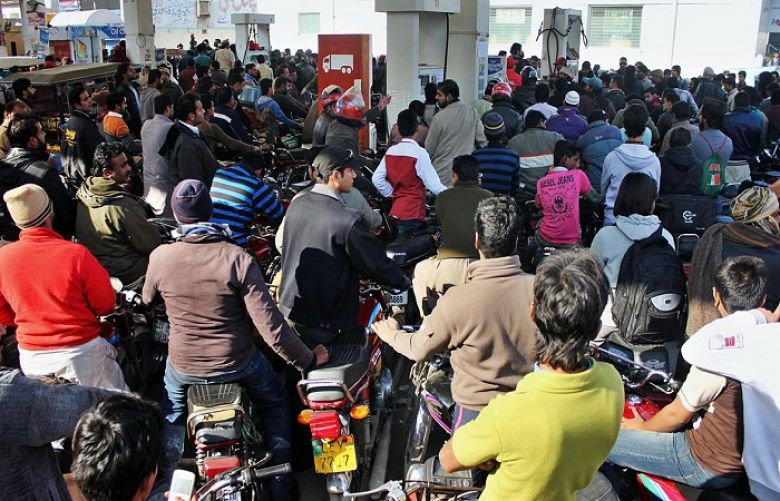The Oil Companies Advisory Council (OCAC), a representative body of the oil marketing companies and refineries – has warned the government of a looming ‘dry out situation’ of petroleum products because of looming port constraints in the wake of imports of liquefied natural gas (LNG).
The warning is a reminder of the severe petrol crisis which hit major parts of the country, including the Punjab and Khyber Pakhtunkhwa in January this year. The OCAC has urged the government to give preference in berthing to oil tankers along with fresh standard operation procedures (SOPs) and undertake massive development activities at port if it wanted to avert another crisis.
The OCAC warning supports fears expressed by Port Qasim Authority (PQA) a few days ago regarding likely berthing delays and explains how a major operation of importing LNG to meet energy needs was undertaken without proper homework.
The OCAC conveyed its concerns after a meeting of the major oil marketing companies held with chief operating officer of Fauji Oil Terminal Company (Fotco) Hassan Sobuktageen to discuss key operational issues.
“There are a number of factors associated with the handling of LNG tankers at PQA which could have a potential impact on planning, scheduling and handling of oil tanker traffic at Fotco and POL vessel berthing delays could be experienced once LNG offloading activities commence at Port Qasim”, wrote OCAC to the federal government.
At the heart of the problem is the location of Fotco terminal at 3.5 kilometres before Engro’s LNG terminal and 1.5 km before the vessel turning point. While the said offloading activity would not hinder POL vessel berthing activity, the outbound POL vessels could experience delay and would not be allowed to exit once the LNG vessel is entering the port through the 42 km long channel since crossing an LNG vessel and other vessels is not permitted.
Around 3.5 million tons of LNG will be brought annually or 290,000 tons per month. Keeping in view international safety requirements, it was possible that small size cargoes of around 40,000-45,000 tons could be brought, instead of Q-Flex of 80,000 tons capacity. This would, however, result in increase in the number of incoming LNG vessels – roughly about seven ships a month.
International safety requirements of SIGTTO (Society of International Gas Tankers and Terminal Operators) further make it mandatory to maintain a minimum distance of one kilometer between an LNG vessel and any other vessel seeking entry into the port at the same time.
On an average, three vessels enter the port during high tide period and it is estimated that berthing or port exiting delays in the order of 8-10 days could be experienced in case POL vessels were not given priority at port entry and exit. This in turn affects vessel turnaround times and disturbs POL product distribution activities “which if not addressed may lead to a potential dry out situation especially in upcountry locations”, said OCAC chief executive officer Dr Ilyas Fazil.
On top of that, night navigation facility would not be available for LNG carriers. The OCAC has asked the government to give priority to POL vessels both at port entry and exit timings over all other vessels including non-POL and LNG and provide monthly LNG vessels schedules at least a week in advance for next month to revised berthing SOPs.
The PQA has also raised concerns over operational, technical and regulatory constraints over normal LNG imports due in a few days and told the government that unless required dredging was not undertaken “other shipping traffic will be hampered and delayed by 9 to 10 hours which will result in heavy financial claims on PQA by other port terminal operators or the LNGC will be delayed, waiting for arrival and departure transit”.
Besides, during monsoon LNG operation cannot take place in these circumstances. Thus, it has been proposed by the PQA to ensure that these arrangements were in place before May 15, 2015.
The PQA has officially raised concerns over preparations for proposed LNG imports later this month and sought top -level intervention from the federal government to resolve the issues before formally ordering LNG imports from Qatar. As a short cut, the PQA has asked the government to ensure that Qatar Gas gives up utilising Q-Flex – a larger ship – and instead use smaller ships for the time being but that would entail higher transportation cost per MMBTU.
In a series of letters to the federal government, the PQA has pointed out that “substantial dredging is required in PQA navigational channel because of the requirement of Qatar Gas for anchorage area, provision of passing bays for shipping traffic widening of two related bouys (8a/9 and 12/12a)”.
Besides, “this in long term depth of 14 meters is required throughout the channel”, it said adding that the cost of dredging shall have to be borne by Qatar Gas as it is their requirement for large size LNGC. “Dredging in front of EETPL (Engro Elengy Terminal Pvt Ltd) is also required and the cost of the same will be borne by EETPL. As per implementation agreement, PQA is only required to allow vessels which can safely operate within the existing port parameters”, it added.







